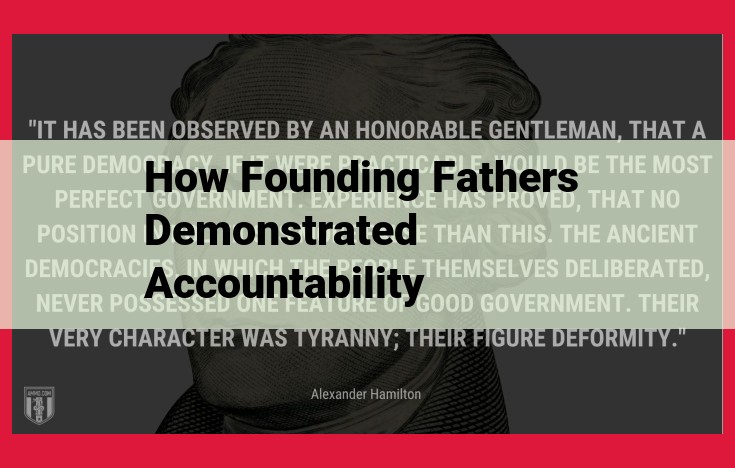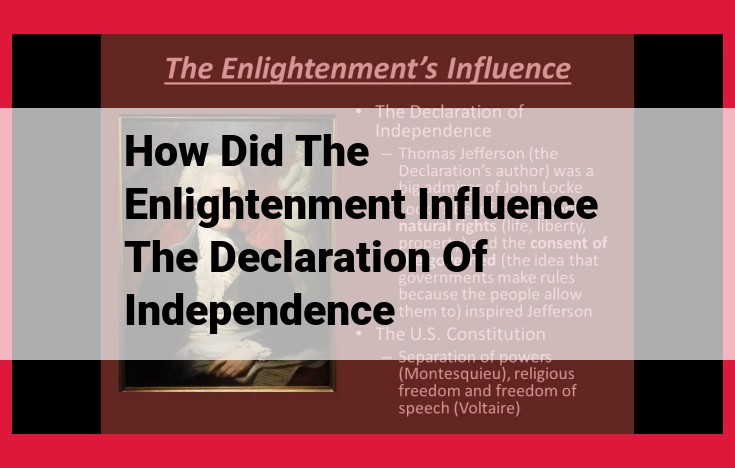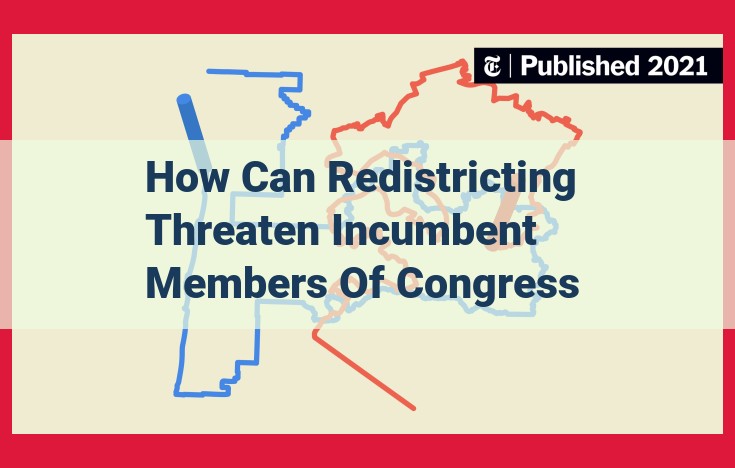The founding fathers demonstrated accountability through political institutions (Congress, Presidency), public discourse (newspapers, debates), social groups (Committees of Correspondence), individual mechanisms (impeachment, elections), moral frameworks (Declaration of Independence, Enlightenment principles), and personal conduct (integrity, honesty). Their actions ensured that individuals and institutions were held responsible for their actions, fostering a culture of accountability in the nascent American Republic.
Political Institutions: Cornerstones of Accountability
In crafting the American Republic, the founding fathers recognized the critical role of political institutions in fostering accountability. The Continental Congress laid the foundation for a system of checks and balances, empowering various branches of government to hold each other accountable. The Constitutional Convention further solidified this concept by establishing a separation of powers and a Bill of Rights to protect citizens from government overreach.
The Presidency embodies the principle of executive accountability. The President is not only the head of state but also the chief law enforcement officer, ensuring the faithful execution of laws. The Congress, representing the people, holds the power of impeachment and oversight, scrutinizing presidential actions and holding the President accountable to the will of the people. This interplay of institutions forms the bedrock of the American system of government, ensuring that power is not concentrated in a single entity but rather distributed among different branches to prevent tyranny.
**Public Discourse: The People’s Voice in Fostering Accountability**
In the tapestry of American history, public discourse has played an indispensable role in holding individuals and institutions accountable to the will of the people. Through newspapers, town hall meetings, and debates, the American people have found a collective voice to shape the course of their nation.
Newspapers: Watchdogs of the Public
From the earliest days of the Republic, newspapers served as vigilant watchdogs, reporting on matters of public interest and exposing wrongdoing. Newspapers like The Pennsylvania Gazette and The New York Journal became powerful tools for citizens to stay informed about government affairs and hold their leaders accountable.
Town Hall Meetings: Public Forums for Dialogue
Town hall meetings provided a direct line between elected officials and their constituents. These gatherings allowed citizens to voice their concerns, question leaders, and hold them accountable to promises made during election campaigns. Town halls fostered a sense of community and reinforced the idea that government was not above the people it served.
Debates: Battlegrounds of Ideas
Debates became heated battlegrounds of ideas, where candidates openly discussed their policies and track records. These debates gave citizens the opportunity to compare perspectives and make informed choices about their leaders. By observing the debates, the public could assess candidates’ knowledge, integrity, and vision for the future.
These instruments of public discourse played a crucial role in creating an informed citizenry, which is essential for a healthy democracy. By keeping the public informed and engaged, they fostered accountability and prevented the concentration of power in the hands of a few. They ensured that the voices of the American people were heard and that their representatives acted in their best interests.
Social Groups: Watchdogs of the Community
- Explain the function of Committees of Correspondence and citizen groups in holding individuals and institutions accountable.
Social Groups: Guardians of Community Accountability
In the nascent American republic, accountability was not merely an abstract concept but a vital force that shaped the nation’s institutions and society. Among the key players in ensuring accountability were citizen groups, which acted as vigilant watchdogs of the community.
One notable example was the Committees of Correspondence. These groups emerged in the mid-18th century as a means for colonists to communicate and coordinate their response to British policies. They played a crucial role in organizing protests, disseminating information, and rallying public support for measures like the Boston Tea Party. By facilitating communication and fostering a sense of collective purpose, Committees of Correspondence strengthened the public’s ability to hold individuals and institutions accountable.
Other citizen groups also emerged to fulfill watchdog roles. Vigilance committees, for instance, took it upon themselves to monitor local government and hold officials to account. They investigated allegations of corruption, fraud, and malfeasance, ensuring that those in power did not abuse their authority. Similarly, town hall meetings, where citizens could directly question their representatives, provided another forum for exercising oversight and fostering accountability.
These citizen groups were not limited to a specific demographic or social class. Men, women, and even children participated in their activities, recognizing the importance of collective action in safeguarding the community’s interests. Their efforts helped create a culture of accountability, where individuals were held responsible for their actions and institutions were subject to scrutiny.
**_Individual Accountability Mechanisms: Safeguards of Power_**
In the intricate tapestry of the American Republic, individual accountability stands as a vital thread, weaving together the fabric of trust between citizens and their elected officials. Mechanisms such as impeachment, recall, and elections serve as potent safeguards against abuse of authority, ensuring that those entrusted with power remain answerable to the people they represent.
Impeachment: A Sword of Last Resort
Impeachment represents the ultimate accountability measure, a solemn process reserved for the most egregious offenses. Under the Constitution, the House of Representatives possesses the sole power to impeach a sitting president, vice president, or other high-ranking official. Upon a majority vote of the House, the accused individual is then tried by the Senate. Should a two-thirds majority of the Senate vote to convict, the individual is removed from office.
Recall: Empowering the Electorate
Recall empowers citizens to directly remove an elected official from office before the end of their term. This mechanism is typically triggered by a petition signed by a significant number of voters. If the petition meets the required threshold, a special election is held, and the voters decide whether the official should be retained or recalled.
Elections: The People’s Verdict
Regular elections provide a fundamental avenue for individual accountability. Every two years, voters elect all members of the House of Representatives, one-third of the Senate, and a number of state and local officials. These elections serve as a periodic assessment of elected officials’ performance and policies. If an official has failed to live up to their responsibilities or has acted in a way that undermines the public trust, voters can use the ballot box to hold them accountable.
By establishing these mechanisms, the framers of the American government sought to create a system where power was not concentrated in the hands of a single individual or group. Instead, they distributed authority among different branches of government and gave citizens direct mechanisms to hold their leaders accountable. These safeguards ensure that those in positions of power recognize that they are not above the law and that their actions are ultimately subject to the judgment of the people they serve.
**Moral Frameworks: Guiding Principles of Conduct**
In the crucible of the American Revolution, as the Founding Fathers forged a new nation, they recognized the imperative of accountability. Embedded in the very fabric of the American Republic lay a profound belief in the power of moral frameworks to guide individual conduct and ensure the responsible exercise of authority.
The Declaration of Independence proclaimed the inalienable rights of all individuals, among them the right to life, liberty and the pursuit of happiness. This fundamental principle laid the foundation for a government accountable to its citizens. The Constitution, with its system of checks and balances, ensured that no one branch of government could become too powerful. It enshrined the concepts of transparency and public accountability through provisions for freedom of the press and the right to petition the government.
Influenced by Enlightenment principles of reason, logic, and individual responsibility, the Founding Fathers believed that an informed and engaged citizenry was essential for accountability. Town hall meetings, newspapers, and debates fostered a vibrant public discourse where ideas were exchanged and government actions scrutinized.
The Declaration of Independence asserted that governments derive their just powers from the consent of the governed, a principle that made elected officials accountable to their constituents. The Constitution provided for elections as a means for citizens to hold their representatives accountable. Additionally, mechanisms such as impeachment and recall ensured that those in power could be removed if they violated their oaths of office.
Integrity, honesty, and transparency were considered cardinal virtues in the founding era. Individuals who displayed personal accountability earned the respect and trust of their fellow citizens. George Washington’s relinquishment of power after two terms as president set a precedent for the peaceful transfer of authority. Thomas Jefferson’s drafting of the Declaration of Independence embodied the courage to speak truth to power. Benjamin Franklin’s admission of mistakes in the XYZ Affair demonstrated the importance of humility and the willingness to learn from one’s errors.
These moral frameworks, deeply embedded in the founding documents and the ethos of the American people, have shaped a culture of accountability that continues to serve as a bulwark against tyranny and a guiding star for a nation dedicated to the principles of democracy and individual freedom.
Personal Conduct: The Pillars of Accountability
At the heart of any accountable system lies the conduct of individuals. In the founding of the American Republic, personal attributes such as integrity, honesty, transparency, and humility laid the groundwork for ensuring responsible leadership.
Integrity: The Foundation of Trust
Integrity is the unwavering adherence to moral and ethical principles. It’s the cornerstone of trust, fostering confidence that individuals will act with fairness and impartiality. By upholding their integrity, leaders demonstrate their commitment to doing what is right, even when it’s difficult.
Honesty: The Foundation of Transparency
Honesty is the truthful and forthright communication of information. It’s essential for fostering transparency, allowing the public to make informed judgments. When leaders are honest, they build trust and credibility, which are crucial for accountability.
Transparency: The Basis for Scrutiny
Transparency ensures that the actions and decisions of public officials are open to scrutiny. It promotes access to information and empowers citizens to hold leaders accountable. By being transparent, individuals demonstrate their commitment to accountability and invite the public to oversee their conduct.
Willingness to Admit Mistakes: A Strength, Not a Weakness
Admitting mistakes is a testament to one’s character. It acknowledges human fallibility and demonstrates a commitment to learning and growth. When leaders are willing to admit their errors, they show humility and create a culture where mistakes are seen as opportunities for improvement, rather than as failures.
Commitment to Public Service: The Motivation for Accountability
Public service is the dedication to serving the interests of the community or nation. It transcends personal ambitions and focuses on the well-being of others. Individuals who are committed to public service are driven by a desire to make a positive impact on society, which in turn motivates them to be accountable for their actions.
By embracing these personal attributes, individuals create a culture of accountability that fosters trust, transparency, and responsible leadership. It’s a culture where leaders are held to a high ethical standard and where citizens have the power to hold them accountable for their actions.
Specific Examples of Accountability: Lessons from History
History provides countless examples of accountability in action, demonstrating the importance of holding individuals and institutions responsible for their actions.
-
George Washington’s Resignation: Following the Revolutionary War, Washington voluntarily resigned as Commander-in-Chief, setting a precedent for the peaceful transfer of power. His departure underscored the principle that even the highest-ranking officials are accountable to the people they serve.
-
Thomas Jefferson’s Declaration of Independence: Jefferson’s declaration eloquently laid out the principles of self-government and citizen responsibility. It emphasized the inherent rights of individuals and the duty of government to protect those rights, creating an enduring framework for accountability.
-
Benjamin Franklin’s Admission of Mistakes: In the XYZ Affair, Franklin exhibited humility by admitting his errors in dealing with French diplomats. His willingness to publicly acknowledge his mistakes set an example of personal accountability and transparency.
These examples serve as important reminders of the critical role accountability plays in maintaining a just and equitable society. They demonstrate that accountability is not simply a matter of enforcing consequences, but also a reflection of a deep commitment to integrity, honesty, and public service. By holding ourselves and our leaders accountable, we strengthen the foundations of our democracy and ensure that the power of government is used for the benefit of all citizens.




